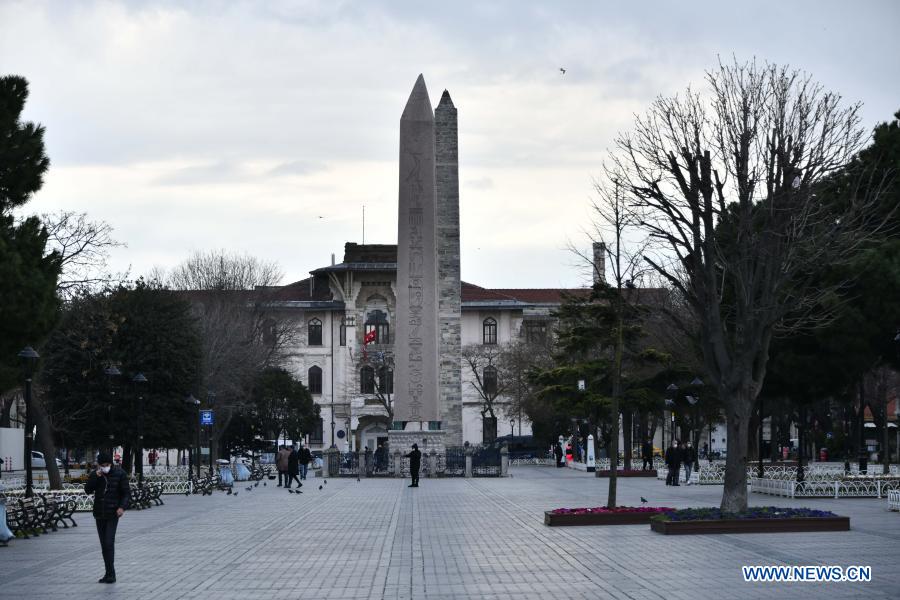
A few tourists are seen at Sultanahmet Square in Istanbul, Turkey, March 16, 2021. Turkey's largest city and cultural and economic hub Istanbul is facing a drastic decline in the number of foreign tourists amid the COVID-19 pandemic, according to recently released official data. In January, Istanbul saw 334,825 tourists with a 67.1-percent year-on-year decrease, the Istanbul Statistical Office announced in its latest report. (Xinhua/Xu Suhui)
ISTANBUL, March 15 (Xinhua) -- Turkey's largest city and cultural and economic hub Istanbul is facing a drastic decline in the number of foreign tourists amid the COVID-19 pandemic, according to recently released official data.
In January, Istanbul saw 334,825 tourists with a 67.1-percent year-on-year decrease, the Istanbul Statistical Office announced in its latest report.
The occupancy rate of the accommodation facilities across the city dropped to 20.2 percent in the same month, from 50.8 percent in 2020, while the total number of foreign tourists visiting Turkey in January stood at 509,787, a 71.5-percent year-on-year decline.
Famous for Byzantine and Ottoman-era monuments and hosting the Bosphorus Strait, which divides the European and Asian continents, Istanbul is the most visited city in Turkey.
In January, Russian tourists visiting the city topped the list with 50,000, followed by Iranians, Germans, the French, and Ukrainians.
"People are bored, and they want to travel against all odds," Irfan Karsli, head of the Istanbul-based Ligarba Tourism travel agency, told Xinhua on Monday.
"With the ongoing global vaccination programs, tourists can be more courageous when deciding to travel," he noted.
However, many countries have tightened the rules, requiring a series of documents such as polymerase chain reaction (PCR) tests and imposing quarantine periods upon the arrival, which made tourists avoid going abroad.
"In the end, everything depends on the number of COVID-19 cases. And, there is no sign of relief so far in the regard," he pointed out.
Istanbul, with a population of more than 16 million, registered 112 cases out of the 100,000 between Feb. 25 and March 5, according to the health ministry's latest data.
In Karsli's view, there can be a slight revival in tourism in Turkey in September and October, but he does not expect a significant recovery this summer.
"Reservations for the summer season should have already closed during this period. However, we do not have enough booking yet," he explained.
Nalan Yesilyurt, a board member of the Association of Turkish Travel Agencies, expects a partial increase in the number of tourists as of May thanks to the vaccination program.
"The vaccination program, which is going on quite fast in Turkey, will provide a sense of confidence to tourists," she told Xinhua.
For Yesilyurt, Turkey, with Istanbul in particular, is still quite in demand among tourists, especially in the European countries.
"Istanbul is a world metropolis with its history and culture. It is a world brand and will always continue to be a center of attraction," she remarked.
Turkey started its nationwide COVID-19 vaccination program with the vaccine developed by China's Sinovac Biotech in mid-January.
So far, more than 11 million doses have been administrated as part of the vaccination campaign, according to the health ministry's latest data.
The Turkish government has recently launched a gradual and controlled normalization period, easing several coronavirus-related restrictions, such as opening restaurants and cafes in low and medium-risk provinces. Enditem